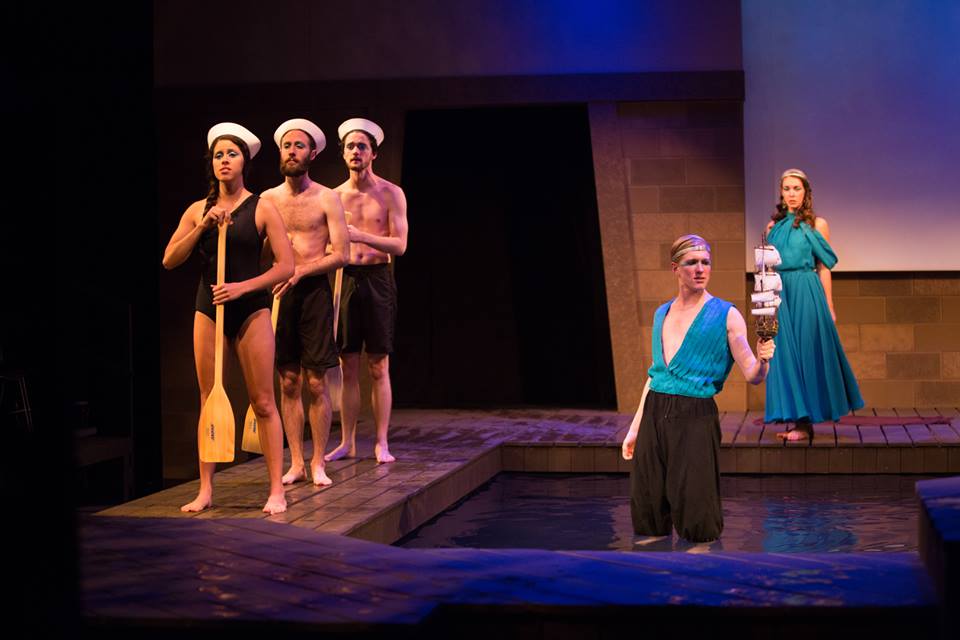I dare you to remember that last time you spent 90 minutes doing one thing (no, sleeping does not count). One thing — without taking notes, texting, eating or nodding off.
It doesn’t happen much these days, and this is one reason I love live theater. When I as an audience member enter a theater, I enter into a temporary artistic contract. I hand over my five bucks and 90 minutes of my undivided attention, and the actors must deliver their side of the bargain — they must tell a story — and it better be good, because my 21st-century attention span is the size of a gnat.
On Saturday night, Calvin Theater Company’s (CTC) production of “Metamorphoses” more than fulfilled their end of the bargain. The production will continue to play this weekend, Nov. 20-22, at 7:30 p.m.
CTC’s “Metamorphoses” delivers all the elements of satisfying drama — humor, humanity and the remarkable synchronization of all the tools of theater.
There are certainly a lot of moving parts to synchronize. Mary Zimmerman’s 1996 play, adapted from the Roman poet Ovid, is anything but easy. The play has a cast of 10 who all play multiple roles in, around or floating on a pool of water.
Despite these hurdles and what I’m sure was a slick surface, the cast took immediate control of the stage and didn’t let go. (There was no intermission.)
I was initially apprehensive about this play. “Ovid” denotes “stuffy” (sorry, classics majors!), and the pool thing seemed like a recipe for awkward.
However, CTC’s presentation of Ovid was extremely accessible – no classics knowledge necessary (though a little bit makes the play even more fun). The play includes several myths which run in and around each other — all relevant and, at times, extremely funny.
Here I’ll insert my complaint. In some of the more solemn myths, the cast, at times, struggled with the mythic proportions of their roles and the play’s language. Grief sometimes quickly escalated into an uninteresting hysteria and passion into an uneasy mush; Zimmerman’s poetic language sometimes got garbled in a whirl of costume changes and splashing water.
But this did not deter from the overall cathartic thrust of these timeless stories.
Sam Camp dependably delivered the most marvelous of rants as both the self-absorbed Phaeton and a drunken satyr. Sadie Burgher bravely tackled several challenging female roles, with great aplomb. Jonathan De Vries made a particularly hilarious lovelorn Vertumnus who performs several mash-dash costume changes in an attempt to find a pleasing guise for his beloved wood nymph.
The water was not awkward: the cast performed their water choreography with deceiving ease.
The specific metamorphosis in each myth significantly occurs in the water, but the pool changes character almost as much as the cast changes costumes. It was a river for laundry, the setting for an incest scene (that got your attention), the entrance to the underworld or, best of all, a storm at sea that had people in the front rows scrambling for their ponchos.
The show used two other highly effective elements, both of them CTC’s personal additions to the production. (The production designers should have received their own round of applause.)
First, the set included a screen with projections of different skies (the original production used still, painted backdrops). The screen cleverly sectioned off the scenes involving gods, who appear on a stage behind and above the screen. Symbolically and physically the skies are reflected in the pool of water, creating lovely images in its surface. (Can we be surprised Narcissus was so entranced?)
Second, the production incorporated a wonderful selection of music — ballads, sea shanties, a Mozart aria (sung with eclat by Brian Alford) and a song actually in Greek (be happy, classics majors!). Impressively, all the music was composed or arranged by members of the company.
Yet, with all the bells and whistles, this play tells the important thing straight — stories are important, and play itself demonstrates the power of story to entrance a listener.
“Unfortunately,” as one character in “Metamorphoses” remarks, “we give our mythic side scant attention these days. As a result a great deal escapes us and we no longer understand our own actions.”
These myths do the great work of all stories. They remind us of what it means to laugh, to grieve, to desire, to hunger, to sleep, to sacrifice, to be changed — to be human.
So, don’t let a “great deal” escape you (pun intended — give bucks isn’t that much). Leave distraction, enter the contract, enter the story and be changed.






